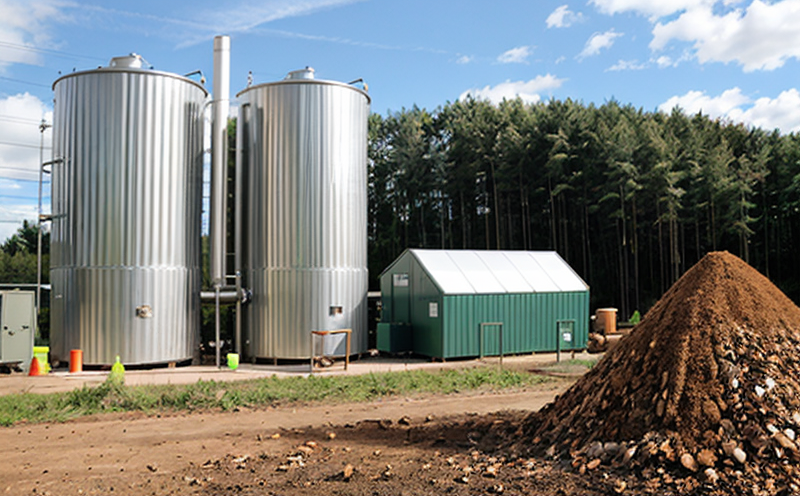ISO 16948 Total Carbon, Hydrogen and Nitrogen Content in Biomass
The ISO 16948 standard provides a precise method for determining the total carbon (C), hydrogen (H), and nitrogen (N) content of biomass. This critical testing ensures accurate characterization of biomass feedstocks used in waste-to-energy conversion processes, biogas production, and other applications where understanding elemental composition is paramount.
Biomass materials are complex mixtures that vary widely depending on their source (e.g., wood, agricultural residues, municipal solid waste) and processing. Understanding the elemental content of these materials helps optimize energy recovery processes, ensuring efficient conversion to biofuels or electricity. The test protocol outlined in ISO 16948 ensures consistent results across different types of biomass samples.
The procedure involves a series of steps designed to accurately quantify C, H, and N using thermochemical analysis techniques. This includes sample preparation (grinding, drying), combustion in an oxygen-rich environment, and subsequent measurement of the gases produced. The accuracy and precision of this method are essential for reliable data that informs process optimization and compliance with international standards.
The importance of ISO 16948 extends beyond mere quantification; it enables informed decision-making regarding feedstock selection, energy conversion efficiency, and waste management strategies. By providing detailed elemental content information, the test supports sustainable practices in the sector by facilitating the development of cleaner, more efficient processes.
For example, accurate carbon content data helps predict calorific value, crucial for determining optimal combustion conditions in waste-to-energy facilities. Hydrogen and nitrogen contents influence process dynamics, such as gasification or fermentation rates, which are key factors in biogas production. Understanding these elements allows for more precise control over the conversion processes, leading to higher yields of valuable products.
Compliance with ISO 16948 is not only important for ensuring accurate characterization but also plays a role in meeting regulatory requirements and industry benchmarks. It supports continuous improvement in waste management and recycling practices by providing a benchmark against which performance can be measured.
Understanding the nuances of this test protocol is essential for professionals involved in quality assurance, compliance, and R&D within the sector. By leveraging accurate elemental content data, these experts can drive innovation and efficiency across various applications of biomass conversion processes.
Benefits
The ISO 16948 test offers several key benefits that are crucial for professionals in the waste management and recycling sectors. Accurate elemental content data ensures that feedstocks used in energy conversion processes are optimized, leading to improved efficiency and higher quality outputs.
- Enhanced Efficiency: Precise C, H, and N content measurements enable better optimization of combustion conditions, resulting in more efficient waste-to-energy facilities.
- Informed Decision-Making: Reliable data supports strategic decisions regarding feedstock selection and process control, ensuring that the best materials are used for specific applications.
- Regulatory Compliance: Adherence to ISO 16948 standards ensures compliance with international regulations and industry benchmarks, reducing legal risks associated with non-compliance.
The test also contributes to the broader goal of sustainability by promoting cleaner energy production methods. By ensuring that biomass is converted into energy in the most efficient manner possible, this standard helps reduce overall environmental impact while maximizing resource recovery.
For quality managers and compliance officers, ISO 16948 provides a robust framework for quality assurance and regulatory adherence. R&D engineers can rely on accurate elemental content data to refine process parameters, leading to innovations that enhance both performance and sustainability.
Customer Impact and Satisfaction
- Improved Efficiency: By providing accurate elemental composition data, ISO 16948 helps facilities optimize their processes, leading to higher yields and reduced waste.
- Increased Transparency: Comprehensive reporting allows stakeholders to better understand the quality of biomass feedstocks, fostering trust and confidence in supply chains.
- Sustainable Practices: The test supports sustainable energy production by ensuring that resources are used efficiently and effectively, minimizing environmental impact.
The ISO 16948 test enhances customer satisfaction through its ability to deliver reliable, accurate data that informs critical decisions. This leads to better product quality and process optimization, which is essential for maintaining competitive advantage in the market.
Customers benefit from reduced operational costs due to improved efficiency and minimized waste. Additionally, the transparent reporting of results builds stronger relationships with suppliers and partners, enhancing overall trust within supply chains.
Environmental and Sustainability Contributions
The ISO 16948 test plays a significant role in supporting environmental sustainability by promoting efficient use of biomass resources. By accurately quantifying the elemental content, this standard helps waste-to-energy facilities operate more sustainably, reducing greenhouse gas emissions and contributing to circular economy principles.
- Reduced Emissions: Accurate elemental content data allows for better management of combustion processes, leading to lower CO2 emissions from biomass conversion.
- Resource Recovery: By optimizing feedstock selection based on elemental composition, this test supports the recovery and reuse of valuable resources.
The use of ISO 16948 in waste-to-energy facilities contributes positively to environmental goals by ensuring that energy is produced sustainably. This standard helps drive innovation towards cleaner technologies, supporting global efforts to combat climate change and promote sustainable development.
Beyond direct emissions reductions, the test also supports broader sustainability initiatives by fostering transparency and accountability within supply chains. By providing clear data on elemental composition, it encourages responsible sourcing practices that align with environmental objectives.





